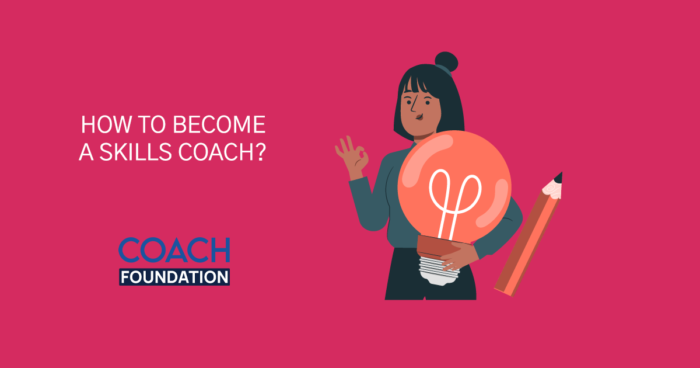Blog » Becoming a Coach » How To Become A Skills Coach?
How To Become A Skills Coach?
Do you want to help people develop their skills? If you’re looking for a career that enables you to help others reach their potential, becoming a skills coach may be the perfect choice.
This guide will provide an overview of what it takes to become a skills coach, including the education and training required and the essential skills and qualities you need to succeed in this field.

So if you’re ready to make a difference in the lives of others, keep reading.
In Brief : How To Become A Skills Coach?
What Are The Benefits Of Becoming A Skills Coach?
- Empowers Individuals – A skills coach empowers individuals to take control of their learning and development for success in their chosen field.
- Deeper Level Of Learning – In the role of a skills coach, you facilitate a deeper level of learning, expanding individuals’ knowledge in their chosen subject.
- Work-Life Balance – Skills coaches often enjoy a better work-life balance compared to traditional teaching roles, offering flexibility beyond the typical 9-5 schedule.
- Satisfaction Of Helping Others – The satisfaction of witnessing others progress and succeed through coaching is a rewarding aspect of being a skills coach.
- Collaboration – Skills coaches collaborate with various professionals, fostering a holistic and supportive approach to individuals’ learning and development.
What Skills Are Required To Be Successful As A Skills Coach?
- Listening And Intuition – A skills coach excels in active listening and intuition, creating a comfortable space for open communication.
- Building Rapport And Trust – Establishing a strong rapport is vital for client comfort, fostering trust and reliance on the coach.
- Asking Practical Questions – Effective coaching involves asking practical questions to understand clients and help clarify their thoughts.
- Providing Constructive Feedback – A skills coach delivers helpful feedback, aiding clients in learning and growth.
- Keen Eye On Observing And Bringing Out Skills From The Client – Successful coaching requires keen observation and bringing out clients’ skills to maximize their potential.
What Is Skills Coaching?
Skills coaching is a process through which an individual can learn and improve upon the skills needed to succeed in their chosen field. This type of coaching can help individuals identify strengths and weaknesses, set goals, and create action plans for improvement. A skills coach can provide support and guidance throughout the process, helping the individual stay on track and progress towards their goals.
While skills coaching can be beneficial for anyone who wants to improve their abilities, it can be constructive for those making a career change or transitioning into a new role. Learning new skills can be daunting, but with the help of a coach, individuals can build confidence and develop a plan for success.
What Does A Skills Coach Do?
A skills coach helps people learn new skills and improve their existing ones. They may work with individuals or groups, and their job is to assess needs, develop training plans, and provide instruction and feedback. A successful skills coach will be patient, knowledgeable, and good at communication.
Skills coaches can work in various settings, including schools, workplaces, and community organizations. They may also offer private coaching services. No matter where they work, their goal is to help others reach their full potential.
What Are The Benefits Of Becoming A Skills Coach?
Some perks of skills coaching include:
1. Empowers Individuals
A skills coach empowers individuals to take control of their learning and development and set themselves up for success in their chosen field.
2. Deeper Level Of Learning
As a skills coach, you will have the opportunity to help others learn deeper, expanding their knowledge and understanding of their chosen subject matter.
3. Work-Life Balance
A skills coach can often achieve a better work-life balance than those in traditional teaching roles, as they are not tied to the 9-5 school day. This allows for more flexibility and freedom to pursue other interests and commitments outside of work.
4. Satisfaction Of Helping Others
Seeing others progress and succeed through your coaching is an incredibly satisfying feeling. Knowing that you have positively impacted someone else’s life is immensely rewarding.
5. Collaboration
Skills coach often works collaboratively with other professionals, such as mentors and teachers, to help individuals reach their full potential. This allows for a more holistic and supportive approach to learning and development.
How To Become A Skills Coach?
Skills coaches work with individuals and groups to help them improve their performance in specific areas. They usually have a background in the area they are coaching and use their knowledge and experience to guide others to success.
If you’re interested in becoming a skills coach, there are a few things you’ll need to do.
- First, you’ll need to get some training and education in the area you want to coach. You can do this by taking courses at a community college or university or online learning programs.
- Next, you’ll need to get some experience working with people in the area you want to coach. This can be done through volunteering, internships, or part-time jobs.
- Once you have the necessary training and experience, you can start working as a skills coach.
What Qualifications Are Needed To Become A Skills Coach?
There are no specific qualifications required to become a Skills Coach, but it is crucial to have a Bachelor’s degree and experience in the field you plan to coach others. It is also essential to communicate effectively and have good people skills.
Suppose you are interested in becoming a skills coach. In that case, it is recommended that you contact your local community college or vocational school to see if they offer any training or certification programs.
What Skills Are Required To Be Successful As A Skills Coach?
To be a successful skills coach, you need to have relevant solid skills. They include:
1. Listening And Intuition
It would be best if you were a good listener to understand what the client is saying and what they mean. It would be best if you also had a strong intuition to guide you in giving advice. The client needs to feel comfortable with you so that they can open up and trust you with their goals.
2. Building Rapport And Trust
It would be best if you built a rapport with the client so that they feel comfortable with you. It is also essential to build trust so that the client feels like they can rely on you.
3. Asking Practical Questions
You need to ask questions that will help you understand the client better and help them clarify their thoughts.
4. Providing Constructive Feedback
You need to be able to give feedback that is helpful and constructive. It will help the client learn and grow from the experience.
5. Keen Eye On Observing And Bringing Out Skills From The Client
It would help if you had a keen eye for observing the client and their skills. You also need to be able to bring out the best in the client to reach their full potential.
What Are The Certifications To Become A Skills Coach?
There are many different certifications that you can get to become a Skills Coach. Some of the most popular and well-known certifications include:
- Certified Professional Coach (CPC)
- Professional Certified Coach (PCC)
- Associate Certified Coach (ACC)
Each of these certifications has different requirements, but generally speaking, you will need to have a certain amount of experience coaching and pass an exam. Once you have one of these certifications, you will be able to work with clients and help them improve their skills.
How Much Does A Skills Coach Earn?
Skills coaches can earn a decent wage, depending on their experience and location. In the United States, the average salary for a skills coach is $33,000 per year. However, those employed by major organizations or with extensive experience can earn much more than this. In some cases, skills coaches can earn over $100,000 per year.
What Are Skills Coaching Methods?
Skills coaching is the process of helping individuals to develop the skills they need to improve their performance in a specific area. Coaches work with their clients to identify the areas where they need improvement and then provide them with the tools and support they need to make progress.
There are many different skills coaching methods available, and the best approach will vary depending on the individual’s needs and goals. However, all skills coaching methods share some common elements, including setting goals, providing feedback, and helping clients identify and overcome barriers to success.
Tips For Becoming A Skills Coach
Some tips for becoming a skills coach include:
- Define your goals as a coach. What do you hope to achieve by coaching others? What specific skills do you want to help them develop?
- Understand your audience. Who will you be coaching? What is their level of experience and expertise? What are their learning needs and preferences?
- Create a coaching plan. Once you know your goals and audience, you can develop a plan to best help them reach their potential. It may include designing exercises and activities, setting deadlines, and providing feedback.
- Be patient and flexible. Learning new skills takes time, so don’t expect miracles overnight. At the same time, be prepared to adjust your plans as needed based on the circumstances.
What Is The Difference Between A Skills Coach And A Talent Coach?
A skills coach helps you improve your ability to do a particular task or activity. On the other hand, a talent coach helps you develop your natural talents and abilities. Talent coaches are usually more expensive than skills coaches, but they can be worth the investment if you have the potential to be truly great at something.
Conclusion
Coaching is an important part of any skill development process. It can help individuals learn new skills and retain the information longer. To become a successful skills coach, there are certain things you need to know.
The guide we’ve provided will teach you everything you need to know about coaching and how to be an effective coach for your clients. We hope that it helps you on your journey to becoming a skills coach.
Frequently asked questions
What Is A Life Skills Coach?
A life skills coach is a professional who helps people improve their lives by teaching them how better to manage their time, resources, and emotions.
How To Become A Life Skills Coach?
If you want to become a life skills coach, you will need experience in counseling, social work, or psychology. You will also need to complete a coaching certification program.
How To Become A Skills Coach?
To become a skills coach, you must first complete a training program that covers the basics of coaching and provides you with the necessary skills. Once you have completed your training, you will need to take an exam to become certified.
How Much Does A Skill Coach Earn?
Skill coaches can earn anywhere from $30,000 to $100,000 per year, depending on their experience and the demand for their services.







I’m curious about virtual communication program.
Hey Aryna, please go ahead and read my article on communication coach certification here: https://coachfoundation.com/blog/best-communication-coach-certifications/